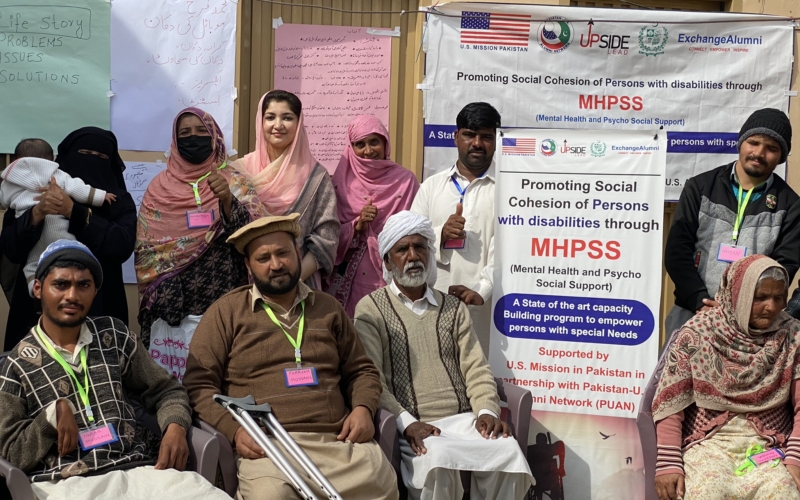By: Shehneela Mazhar
Sumaira Malik, a Global UGrad alumna from 2014, has recently carried out an impactful Small Grant project aimed at promoting social cohesion for persons with disabilities through Mental Health and Psycho-Social Support (MHPSS) in Pakistan. Sumaira has over seven years of experience managing projects that focus on child development, women’s empowerment, quality management and capacity building, human rights, public and mental health, and disability inclusion. She advocates for the rights of persons with disabilities in the most marginalized areas of Pakistan.
The project focused on raising awareness about the integration of the most vulnerable and marginalized community and discussing why social disharmony exists. It aimed to help persons with disabilities manage depression and feel motivated amid the post-pandemic era. Participants were trained on MHPSS as Master trainers to help cope with mental stress, anxiety, trauma, and depression issues. These trainers then trained 40 individuals, with the objective of ensuring better advocacy skills for more inclusive ICT Rights of Persons with Disability and to do the comparative analysis of government development policies with reference to their rights. Local authorities, groups, and people were consulted to understand the needs of communities, assess the lack of available services on the subject of mental wellbeing, and find subsequent challenges faced by people in the community. Finally, a ten-day capacity-building workshop was conducted, and follow-up was exercised.
The post-pandemic era has caused severe depression problems, especially within marginalized communities, and persons with disabilities lie at the center of the crises since they are most vulnerable. The project has had a positive impact on the beneficiaries, as evidenced by Muhammad Aftab and Farkhanda Nawaz’s success stories. Muhammad Aftab has his left body side paralyzed, yet he showed great commitment during training sessions. He takes care of daily household tasks and wants to engage himself in a farming business. During the training, trainers shed light on local business opportunities and tapped into participants’ talents and skills. Aftab vowed to start working on the lines given to him. He is now planning a business model and promised that he would be helped in raising capital and support shall be provided to him in his endeavors in the extension phase of the project. Farkhanda Nawaz is an extremely talented lady and has already started her cooking business. She is currently supplying food locally. The scale of production is small, but she is determined to outreach to a better clientele.
Collaborating with the U.S. Mission and the Pakistan-U.S. Alumni Network (PUAN) for the implementation of the project has been phenomenal for Sumaira. In the past, she has been involved in projects with them, and each time she felt even better than the previous one in terms of personal growth and courage. The U.S. Mission in Pakistan provides great lead and platforms for youth like Sumaira, and she is highly indebted to their support and opportunities.
Sumaira’s project is an inspiration for those who seek to empower marginalized communities and promote social cohesion. Her dedication to making a difference in the lives of persons with disabilities is commendable, and her success stories serve as an encouragement to others who seek to create a positive impact in their communities.

